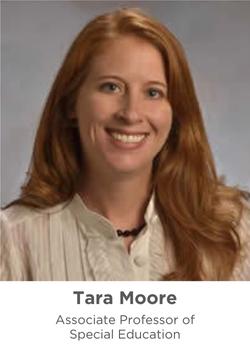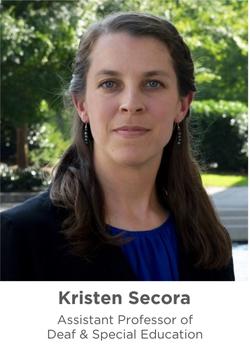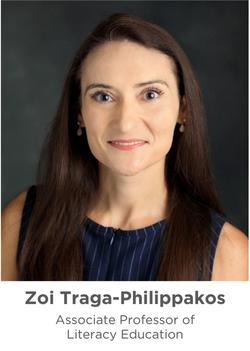Preparing the next generation of special education teachers and researchers through a collaborative, multi-institution project
KNOXVILLE, Tenn. — It’s not every day that faculty researchers have an opportunity to design and implement a project using the same grant competition that funded their own doctoral training. For Tara Moore, associate professor of special education in the Department of Theory & Practice in Teacher Education (TPTE) at the University of Tennessee, Knoxville, College of Education, Health and Human Sciences, this is becoming her reality.
Moore and colleagues, Zoi Traga-Philippakos, and Kristen Secora, will receive a $3.7 million grant from the US Department of Education’s Office of Special Education Programs (OSEP) to provide doctoral-level training for future researchers and preparers of special education personnel. This project, Researching Interventions in Special Education (RISE) Scholars Network, is a collaboration between the University of Tennessee, Knoxville, the University of Nebraska–Lincoln, and Texas A&M University.
 Tara Moore longed for a career where she could connect with and give back to her community after completing her undergraduate studies in sociology at UT. She moved back to her hometown of McMinnville, Tennessee, and began working as a special education teacher in her home district. From there, she began her training to become a licensed special education teacher.
Tara Moore longed for a career where she could connect with and give back to her community after completing her undergraduate studies in sociology at UT. She moved back to her hometown of McMinnville, Tennessee, and began working as a special education teacher in her home district. From there, she began her training to become a licensed special education teacher.
While teaching, Moore became especially interested in students who exhibited challenging behaviors and learning difficulties. She pursued graduate studies at Vanderbilt University where she learned more about how to serve and support these students.
“I went on to enter the Special Education PhD program at Vanderbilt, where I was funded by the same OSEP doctoral training grant competition as the one that is funding the RISE Scholars Network,” explained Moore.
“After completing my doctoral training, I was really lucky to be able to find a position at UT, a top tier university for teacher preparation, where I can continue to give back to communities, teachers, and students in my home state,” Moore continued, “I am thrilled to be able to offer this opportunity to our PhD students here at UT.”
 Kristen Secora, assistant professor of deaf education and special education in TPTE and a speech pathologist by training, expressed similar sentiments.
Kristen Secora, assistant professor of deaf education and special education in TPTE and a speech pathologist by training, expressed similar sentiments.
After working in the public school system to complete her national certification, Secora “realized that a lot was lacking from intervention practices in public schools related to developing and expanding language for kids.”
“I joined the faculty at UT to support current and pre-service educators with the training and resources they need in order to best support communication for their students,” shared Secora. “I love that I get to do that by investing in the next generation of educators and related service providers.”
The RISE project will provide support to twelve PhD candidates across the three universities. While the universities involved might seem random, they are actually the result of an intentional, coordinated effort by the partnering institutions.
Zoi Traga-Philippakos, associate professor of literacy education in TPTE, explained, “I was contacted by a colleague at the University of Nebraska who was instrumental in coordinating the collaboration across the three universities. The goal was to submit a leadership grant in true collaboration with the other faculty and institutions.”
During the RISE program, doctoral candidates will develop social and professional networks with students and faculty from the partnering institutions; learn from leaders in the field; and work collaboratively to develop, implement, and evaluate interventions designed to improve outcomes for students with disabilities and learning and behavioral difficulties. Perhaps what’s most unique about this project is that scholars and faculty will have opportunities to travel to the three partnering universities to foster cross-university collaboration and networking.
“When we were writing the proposal, my colleagues and I kept saying, ‘We want to be students in this program!’” Moore recounted, enthusiastically. “We are all very excited!”
In addition to the educational and professional supports, RISE will provide funding to the PhD candidates. Participating scholars could receive up to five years of funding totaling over $230,000, which will cover tuition, health insurance, travel expenses, dissertation support, technology needs, and an annual living stipend.
Ellen McIntyre, CEHHS dean, is equally excited about the launch of this groundbreaking project: “I am thrilled we are able to provide scholarships for doctoral candidates to get the very best training possible through these exceptional faculty members. They will prepare these new scholars with the best science and a focus on the needs kids, teachers, and schools will have in the future.”
 For Traga-Philippakos, involvement in this project aligns beautifully with her personal mission and self-described “calling” in life.
For Traga-Philippakos, involvement in this project aligns beautifully with her personal mission and self-described “calling” in life.
Hailing from a family that values education and educators, “I loved reading and learning from a young age, and I think my calling was the world of education,” she recalled. “I have a strong belief in the power of education to be a source and force of change, and I strive, through my research, to create equal learning opportunities for all learners so that they can make choices.”
In her work at UT, Traga-Philippakos focuses on designing interventions and assessments and works directly with classroom teachers and students in research, evaluating such interventions and their professional development models. “Recently, I have added to my research interests teacher preparation programs and the ways we, as knowledgeable researchers and teaching faculty, prepare future teachers to support young learners in classrooms,” she explained.
It is undeniable that the RISE program will change lives, both of those participating in the program and of the students and communities they will serve. From this initial cohort of PhD candidates at the three partnering universities will grow a strong network of scholars that will change special education teacher preparation training as we know it. For now, we’re excited to see this groundbreaking project unfold.
“My first childhood dream was to be a scientist. I landed into the field of special education somewhat accidentally,” said Moore, “But having the opportunity to complete my graduate studies fully funded truly changed not only my career, but also my life in so many ways.”
“Now, as a faculty member in special education, my work is centered around my interests and my passions: I’m a scientist, I’m a teacher, I mentor students to conduct research, and I help to prepare and support teachers to use effective approaches to improve student outcomes. I am so happy to pass on this opportunity to the next generation of special education leaders!”
If you would like to learn more about the RISE Scholars Network or apply to the program, visit risescholarsnetwork.org.
To download a PDF about the RISE Scholars Network project, click here.
